So the question of the day is this – how far does a boat have to roll before it becomes impossible to stay in your bunk? Based on last evening's little adventure the answer is about 23 degrees. Both Mr. Miller and me had to sleep on the floor or risk rolling right out of the top bunk before we could even wake up to grab something. We had had an incredible two days in Drake PassageStrait, connecting the Atlantic and Pacific oceans between Tierra del Fuego and the South Shetland Islands. Located about 100 mi (160 km) north of the Antarctic Peninsula, it is 600 mi (1,000 km) wide. – the ocean between the tip of South American and the Antarctic Peninsula, but at about 7 PM last night the wind came up and so did the swells and waves. Here is our current information:
Latitude 64 degrees 3 minutes south Longitude 85 degrees 53 minutes west Air Temp 1 degree celcius Water Temp 1.6 degrees celcius Wind 8 kilometers per hour Sunrise 3:45 AM Sunset 1:00 AM
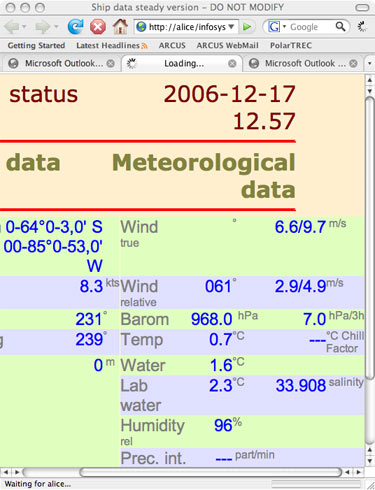
After dinner we enjoyed some great guitar and singing by Bill Everett, our bird expert from Sea World Research Institute. Music must be a common language because it seemed that our friends from Chile and Sweden knew just as many of the Eagles, James Taylor, and Bob Dillon songs as any of the Americans!
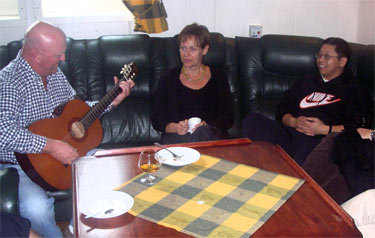
By 9 the boat was rocking steadily – enough that many of us decided to just go lay in our bunks and call it a day. However we quickly discovered in out cabin that the bunks were aligned right with the ship roll, so that everytime the boat took an extreme pitch it would threaten to roll us right out of the bunk. Anything that was not secured was rolling off the shelves, across the floor. With only a small window to look out of, we decided we'd head up to the bridge to get a glimpse of the seas and where we were headed.
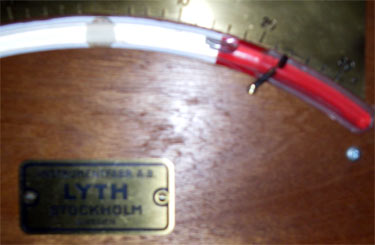
A few days ago I was just getting used to the boat rocking to 8 degrees, as you can see above now we were rocking to 18 degrees – actually we saw it hit 24 degrees but were too busy hanging on to snap a picture! Since it was so tough to stand Ola the First Mate offered me a seat in the Captain's chair.
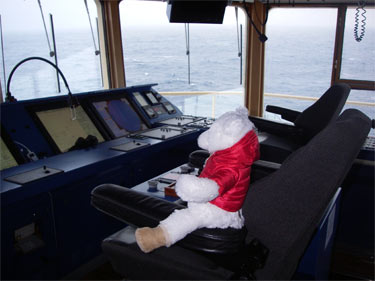
From this viewpoint you could really see the boat rocking in every direction as it rode the 3-4 meter swells as well as the wind driven waves – it is hard to imagine the power of these waves since they threw our 12,000 ton Oden around like a plastic boat in the bathtub. From here you could see that it was rocking in several directions at the same time – the bow was rising and falling due to the large swells, while the wind and waves came from the side and would pitch the boat back and forth sideways. Sometimes those two motions would be in synchrony – the result being the bow would slam down sideways creating a 40-50 foot tall spray and a shudder as the boat absorbed the energy in a quick blast.
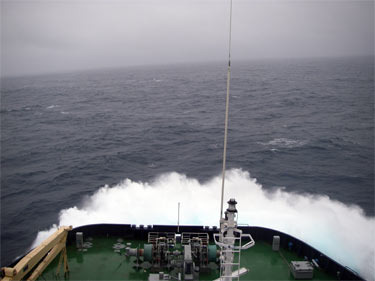
Ola was busy trying to check on the weather and determine whether this would soon pass or if we should turn south and head straight for the Antarctic Peninsula where things will smooth considerably once we're in the ice. Here I am giving him a hand collecting the data he needs to make an informed decision.
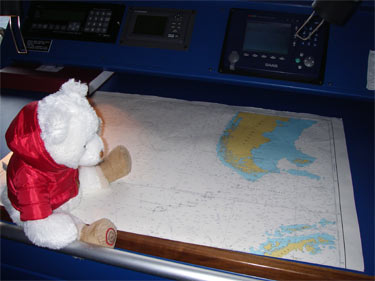
He did decide to alter course a bit to the south – but still we are a full 400 miles from the ice, which at the 10 knot speed we hope to maintain will require at least 40 hours to cross. So with the pitching increasing even more – I hopped back into the Captain's chair with teacher Ute Kaden from Texas and Ola – and enjoyed our free rollercoaster ride.
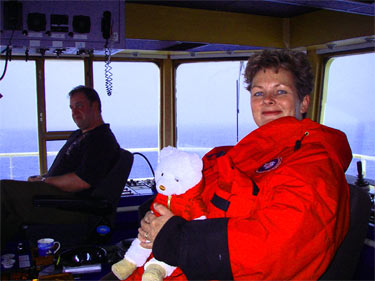
Watching the seas and its treatment of our vessel as a mere children's toy to be tossed about, sure makes you appreciate the power of nature. It gives me an even clearer understanding of what an unbelievable achievement it was for Shackleton, in the tiny Jame Caird, to cross the same sea almost 100 years ago.
Sorry no new animals to report - really wasn't a prime day to get out on the deck and observe - hopefully tomorrow maybe.


Comments